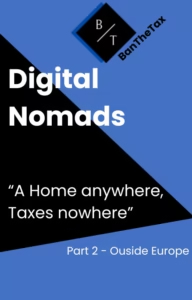
Since the rise of telecommuting in 2020 due to pandemic restrictions, many countries have introduced digital nomad visas, allowing individuals to work remotely from abroad.
Estonia pioneered the digital nomad visa, while Germany was first to offer a self-employed visa (Freiberufler), with separate options for artists and professionals.
Most digital nomad visas are valid up to 12 months and can often be renewed. Staying over 183 days may convert you in a tax resident, therefore, it’s important to check for potential double taxation with your home country.
The digital nomad visas (DNV) often require proof of stable income (Thailand is an exception), which can be a barrier for new entrepreneurs. Minimum monthly income requirements vary ; they generally start around €2,000 : Georgia, Spain, Croatia, Malta ; but can be as high as US$5,000 (Emirates) or more than €7,000 (Iceland). Furthermore, many want you to have bank savings in addition to the monthly/ yearly income.
The case of Montenegro is just wonderful for digital nomads: a monthly salary of only €1,350 makes it the cheapest option in Europe. Furthermore, it gives you straight away an initial visa for 2 years ! Digital nomads seeking a more stable place to stay, that’s the perfect deal.
Eligibility for Digital Nomad Visas
At the core of eligibility for visas in this category is one key requirement: you must perform the income-generating activities remotely, using information and communication technologies. In other words, no in-person services such as door-to-door sales, home visits, or face-to-face interactions with clients are permitted in the hosting country. Your work must be—and remain—strictly remote, carried out via the internet, phone, or similar means.
Entering and Leaving the Country
On a Digital Nomad visa, you are generally not allowed to leave the country during your permit (single entry), but some countries offer a multi-entry visa (Brazil, St-Lucia, Montenegro). However, if your visa is valid for one year or longer, your absence should not exceed six months, or you risk losing your visa. You should check if the visa you apply for allows the re-entry and absences.
Banking Options: Digital nomads often use Wise, N26, and Revolut. While fintech solutions are common, having a traditional bank account as a backup can be useful, especially if your internet connection isn’t reliable. Some regions allow now nomads to open a local bank account too (Costa Rica).
Easy, Affordable Housing: Look for locations with reasonable housing prices. If your accommodation doesn’t support reliable internet access for work, consider using co-working spaces designed for digital nomads. These shared workspaces are widely available in the jurisdictions covered in this document—just search online to find one near you.
When setting up your workspace, consider these key criteria:
- Reliable Internet: For on-site work, prioritize a high-speed internet connection. Nothing more frustrating than working through internet with no internet connection !!
- Affordable Broadband: Many digital nomads are surprised by Romania’s broadband performance, which averages 188 Mbps at a monthly cost of just €7.50! Madeira (Portugal’s remote island) built a special nomads village, offering free internet from 8am to 10pm.
Don’t Forget Postal Mail! Digital nomads who live primarily online still need to manage postal mail. Ensure you have a way to receive your mail and forward it as you move. Many online resources offer tips on managing this process. Just because a digital nomad conducts most of their life online doesn’t mean postal mail should be neglected. It’s still essential to receive your mail and arrange for it to be forwarded to the right addresses as you move from place to place.
Courtesy and Respect for Host Countries
Respecting the local population and customs is not optional—it’s essential. Unfortunately, some travelers forget this, and their lack of courtesy has consequences for everyone. As a result, future digital nomads often pay the price for the mistakes of those who came before.
Take the Seychelles, for example: overwhelmed by a surge of backpackers and remote workers, the country responded by tightening its visa requirements and expelling some tourists and digital nomads. Similarly, in Indonesia, several cases highlight the importance of respecting local culture and traditions—failure to do so can result in being expelled from the country, sometimes forcibly.
Taxation of the digital nomad
The general rule is that you become a tax resident if you physically spend at least 183 days in a given calendar year in the hosting country, let’s call it “country B”. After that, you’ll have to pay personal income tax and social security contributions. Whether your employer also has to pay social security contributions in “country B” will depend on the double-taxation agreement between country B and the country where your employer is registered, and whether your stay in country B creates an official place of business for your employer.
In general, digital nomads choose this lifestyle—at least in part—to avoid paying taxes in the countries where they temporarily reside. Therefore, offering a digital nomad visa valid for over six months is only truly appealing if it includes a tax exemption on foreign income (for instance, Mexico doesn’t tax your foreign income if they exceeds 51% of your global revenue) .
Several jurisdictions exclude, even explicitly, digital nomads from local taxation when they spend more than 183 days on their territory (Croatia, Montenegro). Others, offer a special (advantageous) flat tax rate for the entire duration of the DNV (Spain, Latvia).
Now that you know most of the essential criteria to take into account for your future nomad visa, let’s go through the list of countries around the world. This document address « Europe / Trans-Europe».
The « outside Europe » regions are published separately. Please check our blog regularly to find out.
Which countries can offer you a digital nomad visa in 2025?

First of all, you must consider your citizenship ! Using your country of residence or tax residence does not play here. Only your passport does. Let’s assume that you are a Russian national, you reside in France, and you want to obtain a digital nomad in Malta. Unfortunately, since many countries have labelled Russia/Russian citizens as “the bad guys” since 2022 (Ukraine war) …, they have been consequently banned from a few visa options.
Although Malta and France are both in the European Union, residence criteria has no value here for Russians.
If you’re an EU citizen, you don’t need a Digital Nomad visa to live and work in the European Union, as you have free access to EU territories. However, if you stay for more than 90 days, you will need to register.
Remote workers only need a Digital Nomad visa if they plan to stay longer than the allowed duration of a tourist visa (typically 3 months). Neither visa permits you to be employed by a local company within Europe.
Depending on whether you stay more than three months in Europe or exceeding the limit of a tourist visa outside Europe, we outline the various options available to you here.
In some jurisdictions, laws governing digital nomads have been passed by their Senates, but have not yet been implemented into law at the time of writing (April 2025). Or, they just don’t want to issue a new visa type that is specifically designed to digital nomads. Instead, they have extended their exiting options to accommodate remote workers (Czech Rep, Croatia, Greece, Portugal, etc.).
Although details are not always known at present, the main criteria that countries require to grant a digital nomad visa are proof of monthly income, medical cover, and proof of self-employment or secondment. Sometimes this visa is accompanied by a classic temporary visa or a visa for self-employed workers (Portugal, Czech Rep, Mexico….). This means that you can start with a DN visa, and then you may switch to another visa permit.
Italy and Mexico offer temporary options for up to 4 years !
The difference between a purely Nomad visa and a classic Temporary visa is that the former expires at the end of the granted duration, while the latter can sometimes lead to permanent residence and even citizenship (Argentina, Costa Rica).
Each country has its own policies and regulations in place regarding the digital nomad visas offered in their jurisdictions.
- Some allow you to apply easily online, while others require you to submit your application through an embassy or consulate in person.
- Some offer regional programs for digital nomads (Norway, USA, Italy, …) to repopulate and revitalize “abandoned” regions. These programs are generally very attractive taxwise, and you even have to commit residency for at least a few years.
Part 1 - Europe / Trans Europe
In this document, you’ll find the full range of options available to you for a stay longer than the classic tourist visa. Depending on whether you’re alone or with your family, whether you’re looking to spend a few months or a few years, whether you plan for a temporary residence that will eventually become a permanent one… the offers vary so widely from one jurisdiction to another, that I’m sure you’ll find something that suits you !
Part 2- "Outside Europe "

Part 2 “Outside Europe” coming soon. Don’t miss it !
The other countries will be covered in the Part 2 edition. Come and check in the next days….
